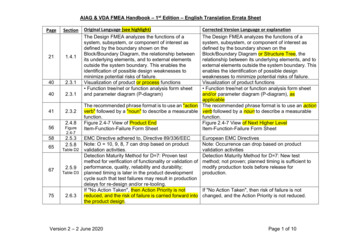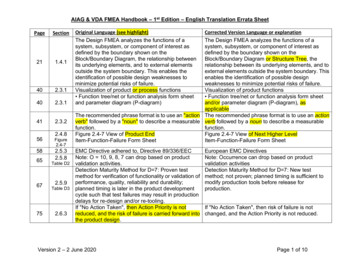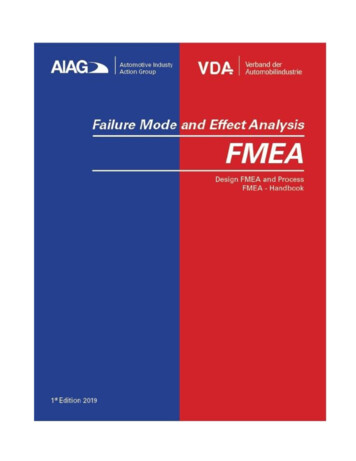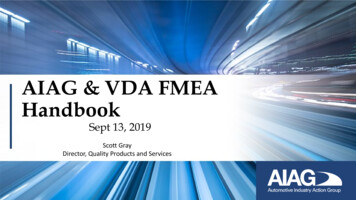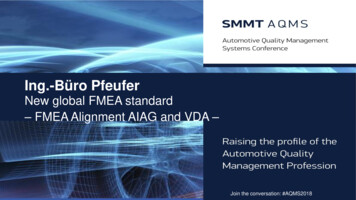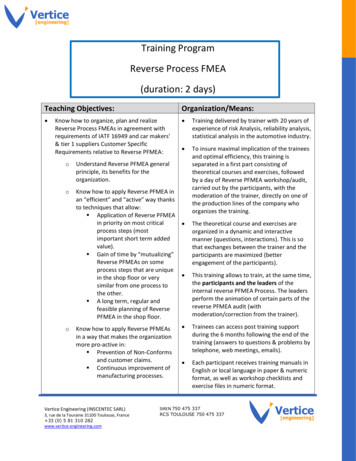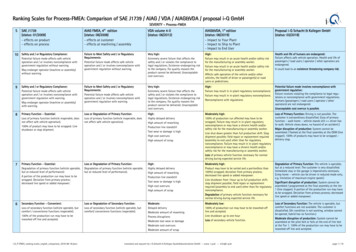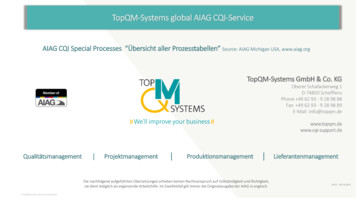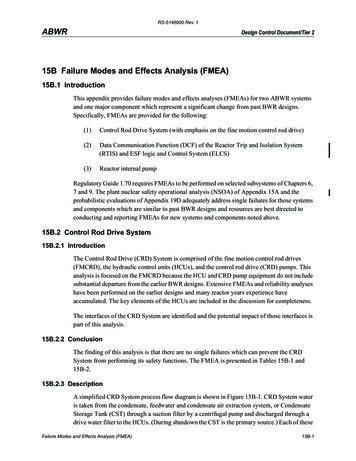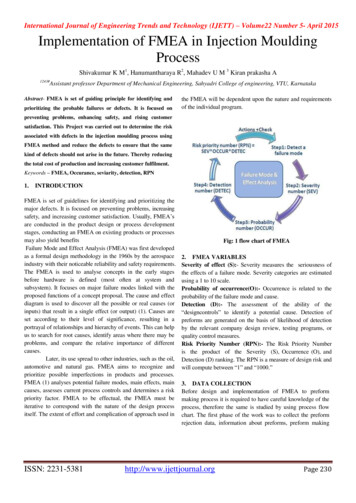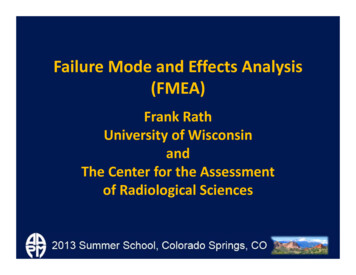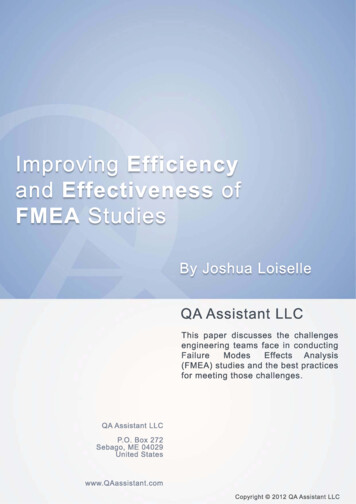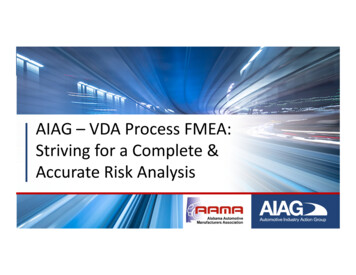
Transcription
AIAG – VDA Process FMEA:Striving for a Complete &Accurate Risk Analysis
Presentation Agenda Project Overview –Scott Gray Process FMEA Introduction –Dave Dalby
AIAG VDA FMEA - Project ObjectiveUpdate to include:- Best Practices- Improved Examples- Functional SafetyProvide consistentdirection, guidance toall automotive suppliers3
AIAG-VDA FMEA Project TeamOEMsSuppliersProjectManagersAIAG Work GroupVDA Work GroupFCA US LLC, Ford, GM,Honda N.A., Daimler Truck NADaimler AG, Ford Europe, Volkswagen AG,Adam Opel AGNexteer, Bendix, ZF/TRW,ON SemiconductorRobert Bosch GmbH, Continental, SchaefflerAG, Knorr-Bremse, ZF Friedrichshafen AGScott GrayJochen Pfeufer4
AIAG-VDA FMEA 7 Step Approach
Supplemental FMEA - MSR FMEA MSR Monitoring and System Response– Addresses Risk Analysis of Mechatronic Systems Not previously addressed in AIAG 4th Edition FMEA– Describes linkages between Design FMEA and Functional Safetyconcepts and analyses– Unique Frequency (F) and Monitoring (M) Rating Tables
AIAG VDA FMEA Handbook The Team Work Continues– Final revisions and final reviews– Completion in March Approvals by AIAG and VDA– Both required to approve the document– Scheduled in April and May, respectively Release of Handbook, 1st Edition, 2019– Targeted for release in June Updated training– Expect global launches in Q3
1st Step: Planning and Preparation for Process FMEAAIAG: “Define the Scope” Establishes Analysis Boundaries. Define what processes are to be included and excluded from the analysis.AIAG - VDA - “1st Step – Planning and Preparation”* In addition to the above-* States the overall advantage of Planning and Preparation is to focus resources on processeswith the highest priority i.e., must processes and highest level want processes.* Direction from a high level of management so all processes that can impact product qualityare considered:* Part receiving and delivery.* On-line and off-line detection controls.* Maintenance processes of critical equipment.
1st Step: Planning and Preparation – Process FMEA
PFMEA Severity* AIAG Severity 9 & 10 - Are applied for safe operation and / or noncompliance ofgovernment regulation defects. The difference between the two rating areWith Warning (9) and Without Warning (10).* With and Without Warning not defined in the manual.* Each user could define what these terms meant.* AIAG - VDA Severity * Severity 10 – Applied to safe operation defects.* Severity 9 – Applied to noncompliance of government regulations.
PFMEA Severity* AIAG – Considers two categories* Effect on Manufacturing – Verbiage implies to your manufacturing plant* Effect on Customer (End User)* AIAG - VDA – Considers three categories* Impact to Manufacturing – Divided into two categories* Impact to Your Plant* Impact to the Ship-to-Plant (when known)* Eliminate or reduce –* Charge-back for customer containment activity.* Manpower sent to support customer on-site sorts & repairs.* 3rd party charges for sorts and repairs.* Management involvement for high impact items to customer manufacturing.* In automotive production – Number of units to repair / Line downtime* Effect on Customer – End User
PFMEA Severity
PFMEA Occurrence & DetectionAIAG Occurrence vs AIAG - VDA Occurrence* AIAG Occurrence - Based on defects per thousand, set for automotive production rates.* AIAG - VDA Occurrence - Based on robustness of Prevention Controls.* Can be applied to any production rate.AIAG Detection vs AIAG - VDA Detection* AIAG Detection - Based on:* “Opportunity for Detection” (4 5 word summary)* “Likelihood of Detection” by Process Control (overview of controls and where applied)* AIAG - VDA Detection – Based on:* Maturity of Detection Method (experience with controls)* Opportunity of Detection (overview of controls and where applied) Rating of 3 & 4 made more stringent – Requires control of rejected product by robust systemto prevent outflow.
Risk Priority Number (RPN) and Action Priority (AP)* AIAG RPN Based on:* Severity x Opportunity x Detection RPN* S, O and D weighted equally.* AIAG - VDA Action Priority Table Based on:* S, O and D considered at the same time while weighting Severity highest, then Occurrence,then Detection, to determine priority of action.* High, Medium, or Low.
Risk Priority Number (RPN) and Action Priority (AP)12345Actual Sev.99999AP Sev9 109 109 109 109 10Actual Occ.864332170AP Occ Actual Det.8 1056 754 552 352 343321AP Det5 65 65 65 62 4Action PriorityHHHML
Structure Analysis (Step 2) – Process FMEA* AIAG - VDA Failure Cause Identification: Add 4M Categories* To aid the users to identify Failure Causes, the 4M approach has been added in this step.* For each Failure Mode, the users are asked to consider the 4M Categories as a source for aFailure Cause.* 4M Categories;* Man* Machine* Material (indirect)* Milieu* Milieu is a term coined in mid-18th century France meaning: “A person’s social environment”* As in - “He grew up in a very strict milieu”* Word was adopted by the English and used to represent - Background, Backdrop, Setting,Context, Scene, Atmosphere.and Environment.* Milieu (EnvironMent)
Rollout of AIAG – VDA FMEA Handbook* Potential rollout path and timing * AIAG - VDA FMEA Handbook to be published by end of Q2 2019* 2 -3 months for training to be developed.* 6 9 months for training to be completed by supplier / company.* Recommend to apply at start of next “major model” development cycle,i.e., business awarded for new drawings.* Discretion of company/supplier to retroactively apply to existing processes.
Any Questions?
1st Step: Planning and Preparation for Process FMEA AIAG: “Define the Scope” Establishes Analysis Boundaries. Define what processes are to be included and excluded from the analysis. AIAG -VDA -“1 st Step –Planning and Preparation” * In addition to the above-File Size: 1MBPage Count: 18
